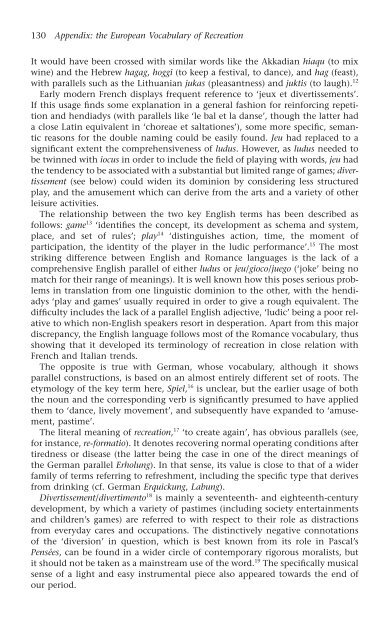Recreation in the Renaissance
Recreation in the Renaissance
Recreation in the Renaissance
- No tags were found...
Create successful ePaper yourself
Turn your PDF publications into a flip-book with our unique Google optimized e-Paper software.
130 Appendix: <strong>the</strong> European Vocabulary of <strong>Recreation</strong><br />
It would have been crossed with similar words like <strong>the</strong> Akkadian hiaqu (to mix<br />
w<strong>in</strong>e) and <strong>the</strong> Hebrew hagag, hoggi (to keep a festival, to dance), and hag (feast),<br />
with parallels such as <strong>the</strong> Lithuanian jukas (pleasantness) and juktis (to laugh). 12<br />
Early modern French displays frequent reference to ‘jeux et divertissements’.<br />
If this usage f<strong>in</strong>ds some explanation <strong>in</strong> a general fashion for re<strong>in</strong>forc<strong>in</strong>g repetition<br />
and hendiadys (with parallels like ‘le bal et la danse’, though <strong>the</strong> latter had<br />
a close Lat<strong>in</strong> equivalent <strong>in</strong> ‘choreae et saltationes’), some more specific, semantic<br />
reasons for <strong>the</strong> double nam<strong>in</strong>g could be easily found. Jeu had replaced to a<br />
significant extent <strong>the</strong> comprehensiveness of ludus. However, as ludus needed to<br />
be tw<strong>in</strong>ned with iocus <strong>in</strong> order to <strong>in</strong>clude <strong>the</strong> field of play<strong>in</strong>g with words, jeu had<br />
<strong>the</strong> tendency to be associated with a substantial but limited range of games; divertissement<br />
(see below) could widen its dom<strong>in</strong>ion by consider<strong>in</strong>g less structured<br />
play, and <strong>the</strong> amusement which can derive from <strong>the</strong> arts and a variety of o<strong>the</strong>r<br />
leisure activities.<br />
The relationship between <strong>the</strong> two key English terms has been described as<br />
follows: game 13 ‘identifies <strong>the</strong> concept, its development as schema and system,<br />
place, and set of rules’; play 14 ‘dist<strong>in</strong>guishes action, time, <strong>the</strong> moment of<br />
participation, <strong>the</strong> identity of <strong>the</strong> player <strong>in</strong> <strong>the</strong> ludic performance’. 15 The most<br />
strik<strong>in</strong>g difference between English and Romance languages is <strong>the</strong> lack of a<br />
comprehensive English parallel of ei<strong>the</strong>r ludus or jeu/gioco/juego (‘joke’ be<strong>in</strong>g no<br />
match for <strong>the</strong>ir range of mean<strong>in</strong>gs). It is well known how this poses serious problems<br />
<strong>in</strong> translation from one l<strong>in</strong>guistic dom<strong>in</strong>ion to <strong>the</strong> o<strong>the</strong>r, with <strong>the</strong> hendiadys<br />
‘play and games’ usually required <strong>in</strong> order to give a rough equivalent. The<br />
difficulty <strong>in</strong>cludes <strong>the</strong> lack of a parallel English adjective, ‘ludic’ be<strong>in</strong>g a poor relative<br />
to which non-English speakers resort <strong>in</strong> desperation. Apart from this major<br />
discrepancy, <strong>the</strong> English language follows most of <strong>the</strong> Romance vocabulary, thus<br />
show<strong>in</strong>g that it developed its term<strong>in</strong>ology of recreation <strong>in</strong> close relation with<br />
French and Italian trends.<br />
The opposite is true with German, whose vocabulary, although it shows<br />
parallel constructions, is based on an almost entirely different set of roots. The<br />
etymology of <strong>the</strong> key term here, Spiel, 16 is unclear, but <strong>the</strong> earlier usage of both<br />
<strong>the</strong> noun and <strong>the</strong> correspond<strong>in</strong>g verb is significantly presumed to have applied<br />
<strong>the</strong>m to ‘dance, lively movement’, and subsequently have expanded to ‘amusement,<br />
pastime’.<br />
The literal mean<strong>in</strong>g of recreation, 17 ‘to create aga<strong>in</strong>’, has obvious parallels (see,<br />
for <strong>in</strong>stance, re-formatio). It denotes recover<strong>in</strong>g normal operat<strong>in</strong>g conditions after<br />
tiredness or disease (<strong>the</strong> latter be<strong>in</strong>g <strong>the</strong> case <strong>in</strong> one of <strong>the</strong> direct mean<strong>in</strong>gs of<br />
<strong>the</strong> German parallel Erholung). In that sense, its value is close to that of a wider<br />
family of terms referr<strong>in</strong>g to refreshment, <strong>in</strong>clud<strong>in</strong>g <strong>the</strong> specific type that derives<br />
from dr<strong>in</strong>k<strong>in</strong>g (cf. German Erquickung, Labung).<br />
Divertissement/divertimento 18 is ma<strong>in</strong>ly a seventeenth- and eighteenth-century<br />
development, by which a variety of pastimes (<strong>in</strong>clud<strong>in</strong>g society enterta<strong>in</strong>ments<br />
and children’s games) are referred to with respect to <strong>the</strong>ir role as distractions<br />
from everyday cares and occupations. The dist<strong>in</strong>ctively negative connotations<br />
of <strong>the</strong> ‘diversion’ <strong>in</strong> question, which is best known from its role <strong>in</strong> Pascal’s<br />
Pensées, can be found <strong>in</strong> a wider circle of contemporary rigorous moralists, but<br />
it should not be taken as a ma<strong>in</strong>stream use of <strong>the</strong> word. 19 The specifically musical<br />
sense of a light and easy <strong>in</strong>strumental piece also appeared towards <strong>the</strong> end of<br />
our period.










